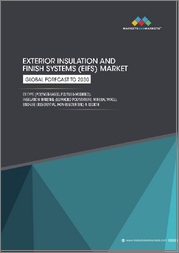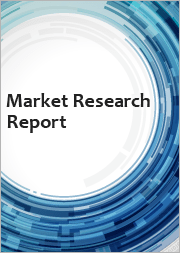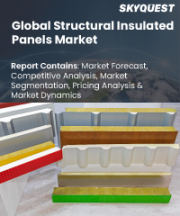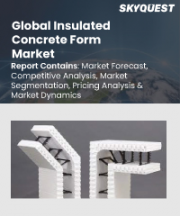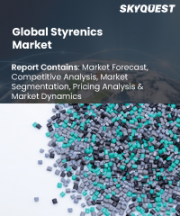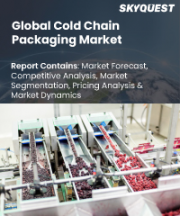
|
시장보고서
상품코드
1820215
발포 폴리스티렌 시장 보고서 : 제품별, 최종 이용 산업별, 지역별(2025-2033년)Expanded Polystyrene Market Report by Product (White, Grey, Black), End Use Industry (Building and Construction, Packaging, Automotive, and Others), and Region 2025-2033 |
||||||
세계 발포 폴리스티렌 시장 규모는 2024년 111억 달러에 달했습니다. 향후 IMARC Group은 시장이 2033년까지 156억 달러에 달하고, 2025년부터 2033년까지 3.65%의 연평균 성장률(CAGR)을 보일 것으로 예측했습니다.
발포폴리스티렌(EPS)은 작은 속이 빈 구체로 이루어진 단단하고 가벼운 셀룰러 플라스틱 소재입니다. EPS는 최소한의 수분만 흡수하고, 수증기 잔류성이 낮으며, 다양한 밀도와 압축강도로 제조할 수 있고, 하중과 되메우기 힘을 견딜 수 있습니다. 압출 폼(XPS)과 비교하여 EPS는 많은 단열재 및 건축 응용 분야에서 비용 효율적이고 고성능의 대안으로 여겨지고 있습니다. 또한, 내열성과 성형성으로 인해 트레이, 접시, 어상자 제조에도 사용되고 있습니다.
EPS는 썩지 않고 쥐나 흰개미와 같은 해충을 유인하지 않는 불활성 소재입니다. 따라서 주택 및 상업용 건축물의 벽, 지붕, 콘크리트 바닥용 단열 패널 시스템으로 사용되고 있습니다. 또한, 도로 및 철도 개발의 경량 성토재, 폰툰 및 마리나 건설의 부력재, 토목 프로젝트의 공극형성 성토재로도 활용되고 있습니다. 이는 건설 활동의 대폭적인 증가와 함께 시장 성장을 가속하는 중요한 요인 중 하나가 되고 있습니다. 이 외에도 충격 흡수 특성으로 인해 EPS는 와인, 화학제품, 전자제품, 의약품의 보관 및 운송에 이상적입니다. 또한, EPS는 식음료(F&B) 산업에서도 인기를 끌고 있으며, 해산물, 과일, 채소 등 신선식품의 보습 및 신선도 유지에 사용되고 있습니다. 이 외에도 포장, 장식품, 구명조끼, 부표 등 구명조끼 등 다양한 최종 이용 산업에서 활용이 확대될 것으로 예측됩니다.
본 보고서에서 다룬 주요 질문
- 발포 폴리스티렌 세계 시장은 지금까지 어떻게 성장해 왔으며, 앞으로 어떻게 성장할 것인가?
- COVID-19가 발포 폴리스티렌 세계 시장에 미치는 영향은?
- 주요 지역 시장은?
- 제품별 시장 분석은?
- 최종 사용 산업별 시장 분석은?
- 산업 가치사슬의 다양한 단계는?
- 업계의 주요 촉진요인과 과제는?
- 세계 발포 폴리스티렌 시장의 구조와 주요 업체는?
- 업계 내 경쟁은 어느 정도인가?
목차
제1장 서문
제2장 조사 범위와 조사 방법
- 조사 목적
- 이해관계자
- 데이터 소스
- 1차 정보
- 2차 정보
- 시장 추정
- 상향식 접근
- 하향식 접근
- 조사 방법
제3장 주요 요약
제4장 소개
제5장 세계의 발포 폴리스티렌 시장
- 시장 개요
- 시장 실적
- COVID-19의 영향
- 시장 예측
제6장 시장 내역 : 제품별
- 흰색
- 회색
- 검정색
제7장 시장 내역 : 최종 이용 산업별
- 건축·건설
- 포장
- 자동차
- 기타
제8장 시장 내역 : 지역별
- 북미
- 미국
- 캐나다
- 아시아태평양
- 중국
- 일본
- 인도
- 한국
- 호주
- 인도네시아
- 기타
- 유럽
- 독일
- 프랑스
- 영국
- 이탈리아
- 스페인
- 러시아
- 기타
- 라틴아메리카
- 브라질
- 멕시코
- 기타
- 중동 및 아프리카
제9장 SWOT 분석
제10장 밸류체인 분석
제11장 Porter's Five Forces 분석
제12장 가격 분석
제13장 경쟁 구도
- 시장 구조
- 주요 기업
- 주요 기업 개요
- Alpek S.A.B. de C.V.(Grupo Industrial Alfa S.A.B de C.V.)
- BASF SE
- Dalian TianLi Engineering Plastic Co. Ltd.
- Evonik Industries AG(RAG-Stiftung)
- Jiangsu Nijiaxiang Group Co. Ltd.
- KANEKA CORPORATION
- Ming Dih Group Corporation
- Ravago
- SABIC
- Synthos
- TOTAL SE
- Xingda Group
The global expanded polystyrene market size reached USD 11.1 Billion in 2024. Looking forward, IMARC Group expects the market to reach USD 15.6 Billion by 2033, exhibiting a growth rate (CAGR) of 3.65% during 2025-2033.
Expanded polystyrene (EPS) is a rigid, lightweight cellular plastic material comprising small, hollow spherical balls. It absorbs minimal water, provides low vapor permanence, and can be produced in varying densities and compressive strengths to withstand load and back-fill forces. As compared to the extruded (XPS) foam, EPS is considered a cost-efficient and high performing alternative in many insulation and construction applications. Moreover, it is employed in the manufacturing of trays, plates and fish boxes on account of its thermal resistance and formability.
EPS is an inert material that does not rot and keeps away pests like rats or termites. Consequently, it is used as an insulated panel system for walls, roofs and concrete floors in residential and commercial construction. It is further utilized as void-forming fill material in civil engineering projects as a lightweight fill in road and railway development and as a floatation material in the construction of pontoons and marinas. This, along with a considerable rise in construction activities, represents one of the key factors bolstering the market growth. Apart from this, the shock-absorbing characteristics make EPS ideal for storing and transporting wines, chemicals, electronic equipment and pharmaceutical products. Furthermore, it is gaining traction in the food and beverage (F&B) industry, wherein it is employed to retain moisture and maintain the freshness of perishable products, such as seafood, fruits and vegetables. Besides this, its applications are anticipated to expand in various end use industries, including packaging, decoration works and lifesaving equipment such as life jackets and buoys.
Key Market Segmentation:
Breakup by Product:
- White
- Grey
- Black
Breakup by End Use Industry:
- Building and Construction
- Packaging
- Automotive
- Others
Breakup by Region:
- North America
- United States
- Canada
- Asia-Pacific
- China
- Japan
- India
- South Korea
- Australia
- Indonesia
- Others
- Europe
- Germany
- France
- United Kingdom
- Italy
- Spain
- Russia
- Others
- Latin America
- Brazil
- Mexico
- Others
- Middle East and Africa
Competitive Landscape:
The competitive landscape of the industry has also been examined along with the profiles of the key players being Alpek S.A.B. de C.V. (Grupo Industrial Alfa S.A.B de C.V), BASF SE, Dalian TianLi Engineering Plastic Co. Ltd., Evonik Industries AG (RAG-Stiftung), Jiangsu Nijiaxiang Group Co. Ltd., KANEKA CORPORATION, Ming Dih Group Corporation, Ravago, SABIC, Synthos, TOTAL SE and Xingda Group.
Key Questions Answered in This Report:
- How has the global expanded polystyrene market performed so far and how will it perform in the coming years?
- What has been the impact of COVID-19 on the global expanded polystyrene market?
- What are the key regional markets?
- What is the breakup of the market based on the product?
- What is the breakup of the market based on the end use industry?
- What are the various stages in the value chain of the industry?
- What are the key driving factors and challenges in the industry?
- What is the structure of the global expanded polystyrene market and who are the key players?
- What is the degree of competition in the industry?
Table of Contents
1 Preface
2 Scope and Methodology
- 2.1 Objectives of the Study
- 2.2 Stakeholders
- 2.3 Data Sources
- 2.3.1 Primary Sources
- 2.3.2 Secondary Sources
- 2.4 Market Estimation
- 2.4.1 Bottom-Up Approach
- 2.4.2 Top-Down Approach
- 2.5 Forecasting Methodology
3 Executive Summary
4 Introduction
- 4.1 Overview
- 4.2 Key Industry Trends
5 Global Expanded Polystyrene Market
- 5.1 Market Overview
- 5.2 Market Performance
- 5.3 Impact of COVID-19
- 5.4 Market Forecast
6 Market Breakup by Product
- 6.1 White
- 6.1.1 Market Trends
- 6.1.2 Market Forecast
- 6.2 Grey
- 6.2.1 Market Trends
- 6.2.2 Market Forecast
- 6.3 Black
- 6.3.1 Market Trends
- 6.3.2 Market Forecast
7 Market Breakup by End Use Industry
- 7.1 Building and Construction
- 7.1.1 Market Trends
- 7.1.2 Market Forecast
- 7.2 Packaging
- 7.2.1 Market Trends
- 7.2.2 Market Forecast
- 7.3 Automotive
- 7.3.1 Market Trends
- 7.3.2 Market Forecast
- 7.4 Others
- 7.4.1 Market Trends
- 7.4.2 Market Forecast
8 Market Breakup by Region
- 8.1 North America
- 8.1.1 United States
- 8.1.1.1 Market Trends
- 8.1.1.2 Market Forecast
- 8.1.2 Canada
- 8.1.2.1 Market Trends
- 8.1.2.2 Market Forecast
- 8.1.1 United States
- 8.2 Asia-Pacific
- 8.2.1 China
- 8.2.1.1 Market Trends
- 8.2.1.2 Market Forecast
- 8.2.2 Japan
- 8.2.2.1 Market Trends
- 8.2.2.2 Market Forecast
- 8.2.3 India
- 8.2.3.1 Market Trends
- 8.2.3.2 Market Forecast
- 8.2.4 South Korea
- 8.2.4.1 Market Trends
- 8.2.4.2 Market Forecast
- 8.2.5 Australia
- 8.2.5.1 Market Trends
- 8.2.5.2 Market Forecast
- 8.2.6 Indonesia
- 8.2.6.1 Market Trends
- 8.2.6.2 Market Forecast
- 8.2.7 Others
- 8.2.7.1 Market Trends
- 8.2.7.2 Market Forecast
- 8.2.1 China
- 8.3 Europe
- 8.3.1 Germany
- 8.3.1.1 Market Trends
- 8.3.1.2 Market Forecast
- 8.3.2 France
- 8.3.2.1 Market Trends
- 8.3.2.2 Market Forecast
- 8.3.3 United Kingdom
- 8.3.3.1 Market Trends
- 8.3.3.2 Market Forecast
- 8.3.4 Italy
- 8.3.4.1 Market Trends
- 8.3.4.2 Market Forecast
- 8.3.5 Spain
- 8.3.5.1 Market Trends
- 8.3.5.2 Market Forecast
- 8.3.6 Russia
- 8.3.6.1 Market Trends
- 8.3.6.2 Market Forecast
- 8.3.7 Others
- 8.3.7.1 Market Trends
- 8.3.7.2 Market Forecast
- 8.3.1 Germany
- 8.4 Latin America
- 8.4.1 Brazil
- 8.4.1.1 Market Trends
- 8.4.1.2 Market Forecast
- 8.4.2 Mexico
- 8.4.2.1 Market Trends
- 8.4.2.2 Market Forecast
- 8.4.3 Others
- 8.4.3.1 Market Trends
- 8.4.3.2 Market Forecast
- 8.4.1 Brazil
- 8.5 Middle East and Africa
- 8.5.1 Market Trends
- 8.5.2 Market Breakup by Country
- 8.5.3 Market Forecast
9 SWOT Analysis
- 9.1 Overview
- 9.2 Strengths
- 9.3 Weaknesses
- 9.4 Opportunities
- 9.5 Threats
10 Value Chain Analysis
11 Porters Five Forces Analysis
- 11.1 Overview
- 11.2 Bargaining Power of Buyers
- 11.3 Bargaining Power of Suppliers
- 11.4 Degree of Competition
- 11.5 Threat of New Entrants
- 11.6 Threat of Substitutes
12 Price Analysis
13 Competitive Landscape
- 13.1 Market Structure
- 13.2 Key Players
- 13.3 Profiles of Key Players
- 13.3.1 Alpek S.A.B. de C.V. (Grupo Industrial Alfa S.A.B de C.V.)
- 13.3.1.1 Company Overview
- 13.3.1.2 Product Portfolio
- 13.3.1.3 Financials
- 13.3.2 BASF SE
- 13.3.2.1 Company Overview
- 13.3.2.2 Product Portfolio
- 13.3.2.3 Financials
- 13.3.2.4 SWOT Analysis
- 13.3.3 Dalian TianLi Engineering Plastic Co. Ltd.
- 13.3.3.1 Company Overview
- 13.3.3.2 Product Portfolio
- 13.3.4 Evonik Industries AG (RAG-Stiftung)
- 13.3.4.1 Company Overview
- 13.3.4.2 Product Portfolio
- 13.3.4.3 Financials
- 13.3.4.4 SWOT Analysis
- 13.3.5 Jiangsu Nijiaxiang Group Co. Ltd.
- 13.3.5.1 Company Overview
- 13.3.5.2 Product Portfolio
- 13.3.6 KANEKA CORPORATION
- 13.3.6.1 Company Overview
- 13.3.6.2 Product Portfolio
- 13.3.6.3 Financials
- 13.3.6.4 SWOT Analysis
- 13.3.7 Ming Dih Group Corporation
- 13.3.7.1 Company Overview
- 13.3.7.2 Product Portfolio
- 13.3.8 Ravago
- 13.3.8.1 Company Overview
- 13.3.8.2 Product Portfolio
- 13.3.9 SABIC
- 13.3.9.1 Company Overview
- 13.3.9.2 Product Portfolio
- 13.3.9.3 Financials
- 13.3.9.4 SWOT Analysis
- 13.3.10 Synthos
- 13.3.10.1 Company Overview
- 13.3.10.2 Product Portfolio
- 13.3.11 TOTAL SE
- 13.3.11.1 Company Overview
- 13.3.11.2 Product Portfolio
- 13.3.11.3 Financials
- 13.3.11.4 SWOT Analysis
- 13.3.12 Xingda Group
- 13.3.12.1 Company Overview
- 13.3.12.2 Product Portfolio
- 13.3.1 Alpek S.A.B. de C.V. (Grupo Industrial Alfa S.A.B de C.V.)







